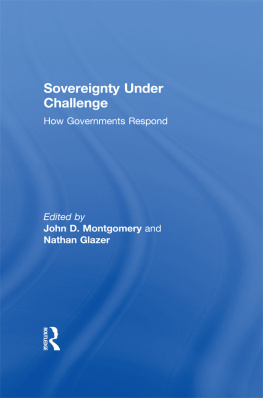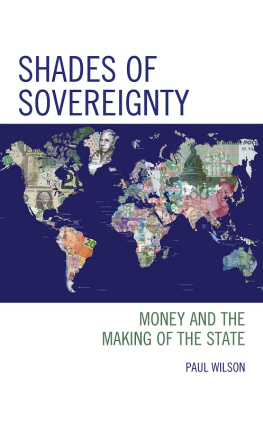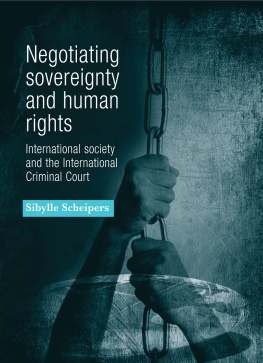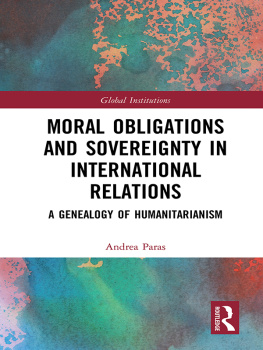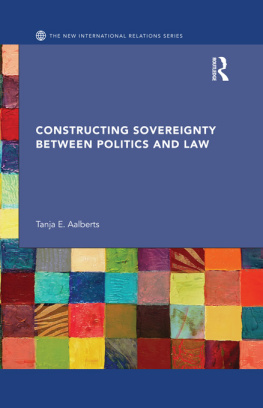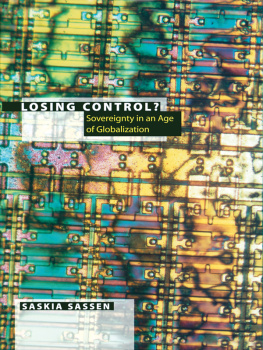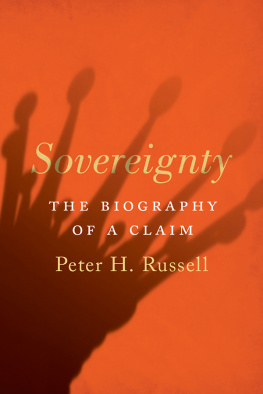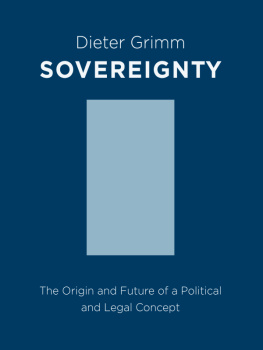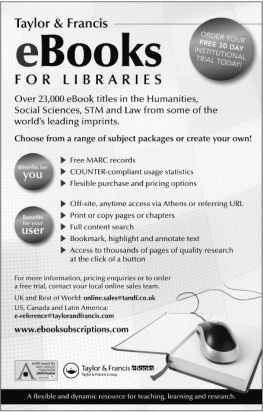Sovereignty under Challenge
First published 2002 by Transaction Publishers
Published 2017 by Routledge
2 Park Square, Milton Park, Abingdon, Oxon OX14 4RN
711 Third Avenue, New York, NY 10017, USA
Routledge is an imprint of the Taylor & Francis Group, an informa business
Copyright 2002 by Taylor & Francis.
All rights reserved. No part of this book may be reprinted or reproduced or utilised in any form or by any electronic, mechanical, or other means, now known or hereafter invented, including photocopying and recording, or in any information storage or retrieval system, without permission in writing from the publishers.
Notice:
Product or corporate names may be trademarks or registered trademarks, and are used only for identification and explanation without intent to infringe
Library of Congress Catalog Number: 2002190377
Library of Congress Cataloging-in-Publication Data
Sovereignty under challenge : how governments respond / John D. Montgomery and Nathan Glazer, editors.
p. cm.
Includes bibliographical references and index.
ISBN 0-7658-0140-X (alk. paper)
1. Sovereignty. 2. SovereigntyEconomic aspects. I. Montgomery,
John Dickey, 1920- II. Glazer, Nathan.
KZ4041 .S67 2002
320.15dc21
2002190377
ISBN 13: 978-0-7658-0140-1 (hbk)
Dedicated to the Students, Staff, and Faculty of Soka University of America
Contents
John D. Montgomery
Nathan Glazer
Sonia Cardenas
Jae Ho Chung
Jeffrey P. Broadbent
Jeremy Shiffman
Ulrich Camen and Charles Norchi
Donald L. Horowitz
Michael G. Peletz
Mikhail A. Alexseev
Ronnie Lipschutz
Rosemary Morales-Fernholz
Dennis A. Rondinelli
Milton J. Esman
Guide
This book is the fifth in a series of policy studies conducted by the Pacific Basin Research Center of Soka University of America. Since its founding on January 2, 1991, PBRC has offered assistance to institutions and individuals who proposed to examine important experiences with sustained efforts to bring about a preferred future. Previous books in the series include:
Montgomery, John D., and Dennis A. Rondinelli, eds., Great Policies: Strategic Innovations in Asia and the Pacific Basin (Westport, CT: Praeger, 1995).
Montgomery, John D., ed., Values in Education: Social Capital Formation in Asia and the Pacific (Hollis, NH: Hollis Publishing Company, 1997).
Montgomery, John D., ed., Human Rights: Positive Policies in Asia and the Pacific Rim (Hollis, NH: Hollis Publishing Company, 1998).
Montgomery, John D., and Alex Inkeles, eds., Social Capital as a Policy Resource (Boston, MA: Kluwer Academic Publishers, 2001). Reprinted from Policy Sciences, Vol. 33, Nos. 3 & 4 (2000).
The Center gratefully acknowledges the logistical and intellectual support it has received during the previous decade of activity while the Director remained at Harvard University, and looks forward to a productive future at its new location at Soka University of America in Aliso Viejo, California.
Sovereignty in Transition
John D. Montgomery
Four centuries ago, sovereignty had the ambitious goal of providing absolute security for the state as part of an accepted international system. It erected the strongest possible legal barricade against foreign invasion or lesser interference with the will of the sovereign. A respected twentieth-century political philosopher described its original function in these vigorous terms: non est potestas super terram quae comparetur ei [there is no power on earth to compare to it] (MacIver, 1926: 15). Today its objectives are subtler but more attainable: it accepts and adapts to foreign and domestic influences even when they challenge the very nature of the state (Esman, this volume). Its claims rest on ethical as well as legal grounds. Contemporary theorists of international jurisprudence argue that the highest moral justification for sovereignty today is its potential to protect human dignity and human rights, not just the state itself (McCorquodale, 1996). These aspirations expand and transcend the philosophical roots of traditional conservative, state-bounded sovereignty (Huntington, 1999/2000).
The protection that sovereignty offers to the state today is piecemeal, conditional, and based on mutually acceptable goals. There can be no sovereign protection for todays fragmented Palestinian state unless Israel expresses a willingness to liberate parts of it, nor can the Pope compensate by proposing to internationalize Jerusalem. Sovereignty cannot be imposed either, but can come only after its preconditions had been satisfied. No state in the conflicted Middle East possesses both the moral authority and the practical capacity to assert it on behalf of Palestine, even if the purpose were to enable a peace to protect all parties.
That limitation applies in stable polities everywhere: the provenance and prospect of sovereignty have depended upon factors beyond international law and assent. The British are sometimes able to have their way in Northern Ireland, but they are unable to proclaim sovereignty there in spite of decades of a forceful and sometimes repressive presence. The United States, the once and perhaps future superpower, accepts divided authority, too, for there, a century after a bitter civil war had been fought to preserve its unity, the nation recognizes a dual sovereignty in which its fifty states exercise final authority up to the point where the central government selectively trumps them. One can also speculate about similar ambiguities that Britain, France, Germany, Spain, Portugal, and Belgium once faced when they aspired to exercise sovereignty over vast Asian and African regions that they had governed for generations. On the whole, history confirms that the essential nature of sovereignty is less than absolute and certainly not universal. When it appears it does so because it is both proclaimed and exercised; it does not protect all claims to statehood, however plausible, and it does not protect even well-recognized states against all the challenges of modern times.
In recent decades the evolution away from absolute sovereignty has accelerated as central authorities have yielded to both internal and foreign forces; sovereignty has eroded as much as it has developed (Fiss, 2001). In addition to the realities of economic and technical globalism, there are newly-recognized moral claims on the state that have displaced the head of government as its sole appropriate or legitimate source of sovereignty. It is no longer considered fanciful to argue that the ultimate rationale for sovereignty is derived from the obligation to pursue a states moral purposes rather than the right to guarantee its power, to protect its territorial integrity, or to advance the material interests of its citizens.
But sovereignty survives even though in protecting the state it is now a contingent, virtual reality that comes fully to life as governments take steps to respond to challenges to their authority. Sovereignty can also lie idle in the many cases when governments offer no response to recurrent storms of global pressures and local demands. The global reach of terrorism demonstrates that attacks can come from anywhere; it is the responses to them that express sovereignty.
This book will explore the implications of this empirical approach to sovereignty. When there have been challenges to the legitimacy of a state, we propose to look to government responses, rather than abstractions or substantive claims under international law, to define the reality of sovereignty. The proposition is that while jurisprudence may recognize sovereignty transcendentally as a states ultimate residual authority (Lasswell and Kaplan, 1950: 178), its practical meaning emerges from its current and protracted exercise.

